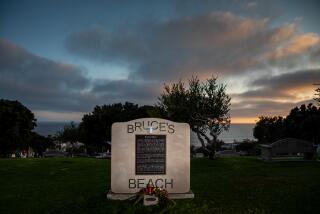Madoff scam victims in California seek tax refunds
- Share via
SACRAMENTO — Hundreds of Californians, many of them elderly and nearly broke, are pressing legislators for help in getting compensation for some of the money they lost in a Ponzi scheme run by confessed swindler Bernard Madoff.
They’re asking lawmakers to change state laws so they can get refunds of past taxes paid on income from Madoff that they might never have received.
“I’ve been victimized once by Mr. Madoff. I don’t want to be victimized a second time by the state of California,” said Gordon Bennett, 62, a retired natural-foods company executive. He lost the $1.5 million he invested with Madoff and recently was forced to sell a beloved home near Tomales Bay in Northern California.
In March, Madoff pleaded guilty in federal court in Manhattan to 11 securities-related fraud counts. He is in jail awaiting a June 16 sentencing hearing.
According to victims, Madoff for decades used the lure of steady, solid earning to entice investors. As a result, his fund grew exponentially, with money from new customers being paid out as dividends to earlier clients until the structure suddenly collapsed late last year under the strain of a deep recession.
Now, more than 400 of his victims who live in California are seeking passage of a bill that would give them the right to get back tax payments on so-called phantom income -- profits that appeared on their annual account statements but didn’t actually exist and were never paid to the investor -- from the last five years.
Such refunds currently are allowed by the U.S. Internal Revenue Service but not by the California Franchise Tax Board, which collects state income taxes.
The group, which represents about a tenth of all victims nationwide of the $65-billion fraud, is led by Richard Shapiro, the former head of the California Horse Racing Board. Shapiro has enlisted the help of state Sen. Dean Florez (D-Shafter) and Barry Broad, a Sacramento-based lobbyist.
Many, if not most, of the victims in California are not “super-wealthy people,” said Shapiro, 56, of Calabasas. “These people are destitute and losing their homes. They desperately need” refunds from the state that in some individual cases could run in the hundreds of thousands of dollars.
Florez, the Senate majority leader and a proponent of greater legislative oversight of state government, plans to take testimony from the Madoff victims at a May 28 hearing in Los Angeles. He’s chairman of the new Senate Select Committee on Investment Malfeasance.
“This isn’t going to be the last scam we hear from,” he warned. “We have to have some understanding of the limits of the law and how the state of California is going to treat this particular tax issue.”
The senator also asked the Legislature’s lawyers to research the effects of conforming state tax laws to federal rulings and determine what effect such a change could have on revenues at a time when the state government faces continuing budget deficits.
The state’s refusal so far to make its income tax rules conform with federal law is inherently unfair, complains Paul Allen, 89, who lives with his 86-year-old wife in a retirement facility in Thousand Oaks. “We paid taxes on something we were not supposed to pay taxes on because it wasn’t there,” he said. “I know the state needs money, but by the same token so do we.”
A state tax refund “would enable me to at least go out and buy a pair of pants if I needed them,” he said. “At this point I’m not paying out any money outside of necessities like gas, taxes and insurance.”
Genae Compagna, a bookkeeper whose employer helped her place her $250,000 nest egg with Madoff, agrees with Allen and other victims seeking state refunds.
Compagna said she watched her boss invest with Madoff for 20 years, and “there never was a problem. . . . I felt so incredibly lucky that he allowed me to be part of it.”
She said she even allowed her 15-year-old son to invest $1,700 with Madoff, and, now, “my poor little kid loses his money.”
Compagna blames the U.S. Securities and Exchange Commission for finding no inappropriate activities at Madoff’s fund after conducting reviews in 1992, 2002 and 2006.
Madoff this year confessed that he never made the trades he reported in statements to his clients.
“I would rather have my money buried in the yard than take a risk, but this was something I felt comfortable with,” she said. “There were so many people involved, but it was a very clever trick.”
--
More to Read
Sign up for Essential California
The most important California stories and recommendations in your inbox every morning.
You may occasionally receive promotional content from the Los Angeles Times.











